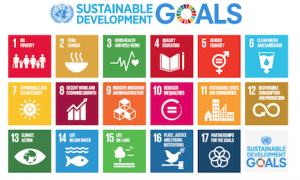Ghana cannot achieve SDGs without reliable data – GSS

Ghana cannot achieve targets set for the Sustainable Development Goals (SDGs) by 2030 without reliable data, Mr Omar Seidu, the Head of Demographics and Coordinator for the (SDGs) at the Ghana Statistical Service (GSS) has said.
He said reliable data remained essential in national development planning, saying, it offered numerous opportunities for decision making, hence, the need for the nation to take advantage of technology to improve on its database.
Technology, he observed, held great potential for data production and its usage, stressing deployment of technology for administrative purposes enhanced productivity.
Mr Seidu was speaking at the launch of the Gender Based Violence and Waste Management Reporting APP held in Techiman in the Bono East Region.
As a realistic tool to achieve particularly global goals six and seven, the App seeks to help address trending challenges on environmental degradation and domestic violence.
“Data must come in a form and at a time when people could access, refine and use them for relevant purposes”, Mr Seidu stressed saying, data revolution provided governments an opportunity to produce more useful data and planned for the future.
He said the GSS was the first in Africa to implement the launch and implement the App to help monitor the nation’s progress in achieving the SDGs.
The App, he explained was being piloted in the Techiman, Ho, and Ga East Municipalities and the Central Gonja District.
Mr Seidu noted that data had taken the centre stage of global discourse, as it remained central to helping societies make real and meaningful progress.
“Data needs of countries are changing to address intertwined global and local challenges of climate change and spread of infectious diseases”, he said.
He said the GSS was collaborating with the Ministry of Gender, Children and Social Protection, Ministry of Sanitation and Water Resources, and the Ministry of Local Government and Rural Development to implement the App.
Other collaborators included the Ghana Health Service, National Commission for Civic Education, German Development Cooperation, United Nations Development Programme, the University of Ghana, and the Coalition of NGOs in Water and Sanitation (CONIWAS).
“We must consider how we involve the general population and the powerful mobile devices they hold to get the information we require on the project implementation, monitoring, and evaluation at the points closest to them in their communities”, Mr Seidu said.
“In the same way, we must provide them with the feedback on what their inputs have helped to uncover or enhance. We have always needed people to support our bid to generate quality and reliable data and we must also not leave anybody behind in the use of the data”.
Madam Effua Anyanful, the Director in charge of Research, Statistics, and Information Management at the Ministry of Gender and Social Protection, observed that gender-based violence threatened the national development process.
She commended the GIZ, GSS, and the Technical Teams for the implementation of the App, saying it remained an alternative and surest way towards addressing and reversing the surging trend of gender-based violence in local communities and the country at large.
Source: GNA
